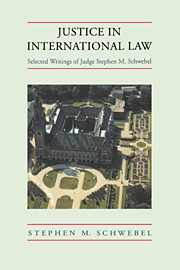Book contents
- Frontmatter
- Contents
- Preface
- PART I International Court of Justice
- PART II International Arbitration
- 10 Arbitration and the Exhaustion of Local Remedies (with J. Gillis Wetter)
- 11 Arbitration and the Exhaustion of Local Remedies Revisited
- 12 Some Aspects of International Law in Arbitration Between States and Aliens
- 13 The Majority Vote of an International Arbitral Tribunal
- 14 The Prospects for International Arbitration: Inter-State Disputes
- PART III United Nations
- PART IV International Contracts and Expropriation
- PART V Aggression under, Compliance with, and Development of International Law
- List of publications
- Index
11 - Arbitration and the Exhaustion of Local Remedies Revisited
Published online by Cambridge University Press: 06 November 2009
- Frontmatter
- Contents
- Preface
- PART I International Court of Justice
- PART II International Arbitration
- 10 Arbitration and the Exhaustion of Local Remedies (with J. Gillis Wetter)
- 11 Arbitration and the Exhaustion of Local Remedies Revisited
- 12 Some Aspects of International Law in Arbitration Between States and Aliens
- 13 The Majority Vote of an International Arbitral Tribunal
- 14 The Prospects for International Arbitration: Inter-State Disputes
- PART III United Nations
- PART IV International Contracts and Expropriation
- PART V Aggression under, Compliance with, and Development of International Law
- List of publications
- Index
Summary
Some twenty years ago, Dr. J. Gillis Wetter and the author wrote an article analyzing, particularly in the light of litigation before the International Court of Justice, whether:
Where a State and an alien agree in a contract to arbitrate disputes relating to the contract, in terms which indicate that arbitration is to be the exclusive remedy, need the alien exhaust any other remedy before an international claim may be presented relating to a dispute which falls within the scope of the arbitration clause?
After extended analysis of the arguments of the parties in The Losinger & Co. case, the Anglo-Iranian Oil Company case, the Electricité de Beyrouth Company case, and the case concerning the Compagnie du Port, des Quais et des Entrepôts de Beyrouth and the Société Radio-Orient, as well as the pertinent provision and preparatory work of the World Bank's Convention on the Settlement of Investment Disputes between States and Nationals of Other States, it was concluded that, as the Report of the Bank's Executive Directors on the ICSID Convention stated:
It may be presumed that when a State and an investor agree to have recourse to arbitration, and do not reserve the right to have recourse to other remedies or require the prior exhaustion of other remedies, the intention of the parties is to have recourse to arbitration to the exclusion of any other remedy.
It was further concluded by the authors that:
However, as the argumentation in the Losinger and Compagnie du Port cases suggests, the decisive factor may be not simply the intention of the parties to have recourse to arbitration only; it may and probably should be whether the arbitration proceedings are or are not subject to the law of the contracting State. […]
- Type
- Chapter
- Information
- Justice in International LawSelected Writings, pp. 191 - 195Publisher: Cambridge University PressPrint publication year: 1994
- 1
- Cited by



